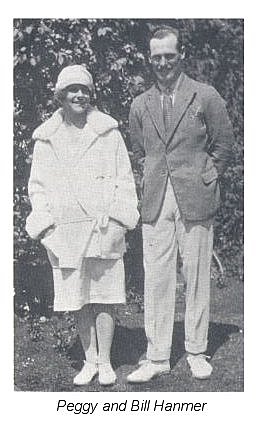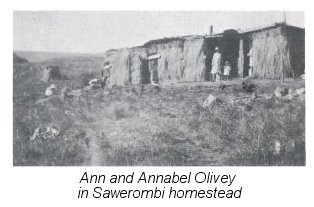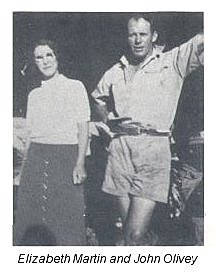
In 1927 Powys-Jones was posted as Assistant N.C. to Melsetter, a name
which, in the hot Mazoe valley, conjured up pictures of green hills and
mountains, mist, cool days, cold nights and cheerful log fires. Mrs. P-J packed
their possessions with piles of golden grass in cases made of wood from the veld
tied with tambo bark stripped off vines and soaked in water to make it
pliable.
Their belongings were sent ahead on donkeywagons from Umtali, and the
P-Js followed by motorcar. A Police Sergeant was also on transfer, and looking
down from the top of a very steep hill they saw in a drift below them an
overturned wagon: boxes, crates, furniture, scattered everywhere, and donkeys
quietly nibbling roadside grass. �Oh, poor Sergeant�, they thought, �how awful,
all his household goods flung about in the dry river bed.� When they got down
they found to their horror it was their own possessions! Before they could pass
the wagon had to be righted, the donkeys caught and inspanned and the wagon
moved out of the way. It was weeks before that load of furniture arrived, and
their first load contained beds without mattresses, basins without jugs, and
nothing to cook in.
Their new home, which the Garsides now own, was a pretty thatched
cottage covered in pink roses. Their predecessors were keen riders, and as there
was no stable they had turned the bathroom into one, with the bath as the
feeding trough: not an ideal arrangement. A beautiful stream irrigated the
garden, but seven inches of rain one weekend were too much for the little stream
which promptly burst it banks and went in through the back door � with inches of
water rushing through the house and seeping into the rooms � and out of the
front door, cascading down the high and wide flight of steps taking with it mud,
sticks and leaves. The roof was not very waterproof, and on one occasion the
P-Js sat up in bed to enjoy their early morning tea with open umbrellas over
their heads. To preserve food two petrol tins were kept in a sack with a tin on
top to drip the water.
Everyone grew their food and made their clothes; there were- no
hairdressers, so everybody looked the same: the only comfort was that everybody
looked peculiar.
One Sunday afternoon in very clear weather and high wind a veld-fire
began, and P-J rushed off to turn out the bandits and collect all possible
helpers to counterfire and put out the flames to save the threatened school and
village. Up their mountainside fire came on three sides: Mrs. P-J collected
their child, the horse, the dog and precious cat, all very frightened, and with
cat in basket, dog on lead, horse by halter and Collette by hand, round and
round the flowerbed in front of the house they went, changing direction when
they got giddy. The fire passed and no sparks fell on the thatched roof.
There was a great occasion when song and noise came on the wind from
Pork Pie. One of the Martins had shot a marauding lion, and a throng of Africans
singing the great Lion Song eulogising the hunter streamed behind the great
beast tied to two poles and carried with pride through the village. Their burden
was put down in front of the Office to the continued shouting of their song.
Everyone congregated to watch the scene, but were soon driven away by the
pungent smell of the King of Beasts.
Donkeys were very much bound up with their lives, and when at Nachtmaal
they invaded Mrs. P-J�s lovely precious garden and ate it all flat, she
impounded the lot. When Collette was returning from school on a temperamental
donkey it got rid of her and galloped to the house minus child and attendant
messenger: Mrs. P-J and the gardenboy
rushed off and found the anxious messenger and sobbing but unhurt
child.

When Mrs. P-J was ill with blood-poisoning from pruning roses, Dr. Rose
was away and a doctor out from Umtali for Mr. Longden was asked to see her, and
decided to operate straight away. The boy with the key to Dr. Rose�s surgery was
located and the carvers which had been used to cut off Daantjie Steyn�s leg were
brought up to the house and Mrs. P-J sterilised them in a baby bath on the No. 8
Dover stove. The doctor gave her morphia, her husband gave her chloroform, and
out she went. The doctor told P-J to bring her into hospital first thing the
next morning, and she hadn�t come round properly when he wakened her and told
her to get up. She tottered along to the bathroom, washed, dressed and got into
the car. As a result of the anaesthetics she had to stop every half hour, and it
took thirteen and a half hours to reach Umtali hospital. There she heard them
planning to amputate three fingers, and when her husband came up at visiting
hour she was dressed and ready to go � which she did without signing out. It was
a long journey home again, and it took many months to get her hand really
right.
Lack of a doctor on the spot was keenly felt. When the P-Js came they
were riddled with malaria, and once P-J was unconscious in one bedroom and
Collette delirious in the other. But neighbours were kind and helpful, everyone
helped everyone else, and in spite of the drawbacks it was a lovely life and the
Powys-Joneses adored it.
Longden�s illness was serious and he was not expected to live. Mrs.
Longden, being a practical woman, ordered a coffin from Umtali. By the time it
arrived on the Post Lorry Longden�s condition had improved, so the box was
safely stowed away in one of the hotel�s spare bedrooms with the door firmly
locked to save shock, horror and embarrassment. Longden was advised to live at a
lower altitude, and in 1928 he and Mrs. Longden moved to Umtali and later to
Natal.
In 1927 Hanmer Brothers bought Fairview and Heathfield, imported Merino
ewes and by 1929 the flock numbered 800 and proved the suitability of
establishing the industry on a considerable scale. William and Peggy Hanmer made
their home on Fairview and both worked indefatigably for Melsetter until they
moved to Inyanga in 1952, when their son Tony ran Fairview. Some of the five
Hanmer children were born at Fairview, and for Janet�s birth Dr. Rose attended
and Sister du Plessis came from Umtali. It was midwinter and very cold, and
Peggy was in a draughty room with the walls not up to the roof. The primitive
conditions evidently weighed on the well-trained nurse�s mind because when Peggy
was asleep after the baby was born Dupie had a dream in which the devil said
that the woman would die if she did not give her some air, so Dupie went through
and opened a window. A little later she dreamed that the devil returned and
asked what was the good of opening a window when the woman was already dead, so
Dupie went back to the all too well ventilated bedroom and this time wakened
Peggy to reassure herself that she was alive.

John Olivey first heard of
Melsetter in 1928 when J. C. Kruger wrote in the Rhodesia Herald about the great
possibilities for Merino sheep in Melsetter, and he and some friends decided to
go and have a look at the area. They read up Melsetter in the 1924 South &
East African Year Book and Guide: �98 miles South of Umtali the road leads along
the watershed. Coaches run weekly, fare 80/- each way; luggage allowance 30 lbs.
Wagons take five or six days during the dry season. Settlers have been tempted
chiefly by the fertile land and favourable prospects both as regards agriculture
and cattle raising. (Small Hotel). White population of the township 114 and of
the district 746 (1921). Natives about 23 000. Even the birds and insects
frequenting it are said to be peculiar to this area.�
As they set out from Umtali they visualised 98 miles as taking three to
four hours, but the journey took all day and early nightfall. Crossing the
Mpudzi river was the first hold-up, where the heavy sand drift was impassable
for cars on their own, and for 10/- one was towed across by oxen which had first
to be located before being inspanned.
They arrived at Melsetter Hotel about 8
p.m. and were not made very welcome so made enquiries for another hotel! As
there was a fine smell of curry they thought supper could not be far off: John
learned later that a bush �peculiar to this area� smells very like curry. Mine
host opened the bar and soon mellowed sufficiently to produce some cold meat and
vegetables.
Before leaving Salisbury John had made enquiries about Government land,
and was told of a farm provisionally reserved as an Experimental Farm, which the
Government would sell provided the price were right: enquiries in Melsetter
proved this to be in fact the Chimanimani Mountains � and he looked elsewhere.
Sawerombi was brought to his notice, and the party was introduced to John Martin
who had the selling of it for Longden. He in turn introduced them to Stanley,
who provided horses and took them over Sawerombi, going out via the Waterfall on
the old pioneer road and returning over Pork Pie.

They went to a tennis party at the School, where Mr. and Mrs. Hallas
made excellent hosts and a good time was had by all who had turned out to see
the new arrivals. The court had very little clearance behind the back lines, and
on one side a large rock of approximately the right height was used to hold up
the net while the other side was supported in a more conventional fashion by a
tree. John�s party decided that the balls must have been brought in with the
early settlers: one even disintegrated in mid-air.
Negotiations for the sale of the farm proceeded, and on 1st October
1928 transfer passed to John and he settled in.
Besides the annual Gymkhana
and Race Meetings and weekly tennis other pleasures were found in horse rides
and picnics. People sent their horses out to Rocklands on Saturday and met there
on Sunday to ride through the Pass to the Portuguese border post. There, if
prior warning had been given, the Commandant entertained the party to lunch with
periperi chicken, wine and a gramophone of old vintage. The Commandant had only
one musical piece, so �England, Hope and Glory� churned out during lunch, with
everyone enjoying everything. Back at Rocklands Mrs. Martin, friend of all,
produced tea and cakes in her small front parlour, while Mr. Martin entertained
the men with home-made peach brandy, and the weekend picnic was declared a great
success.